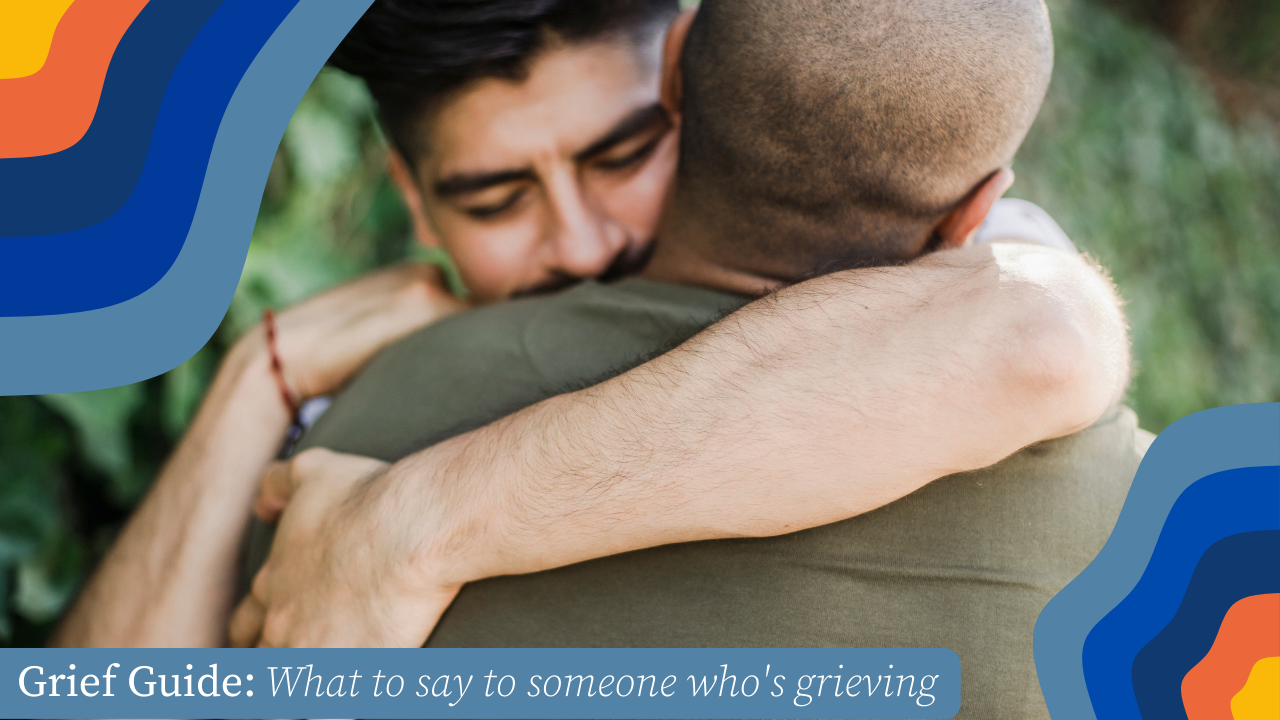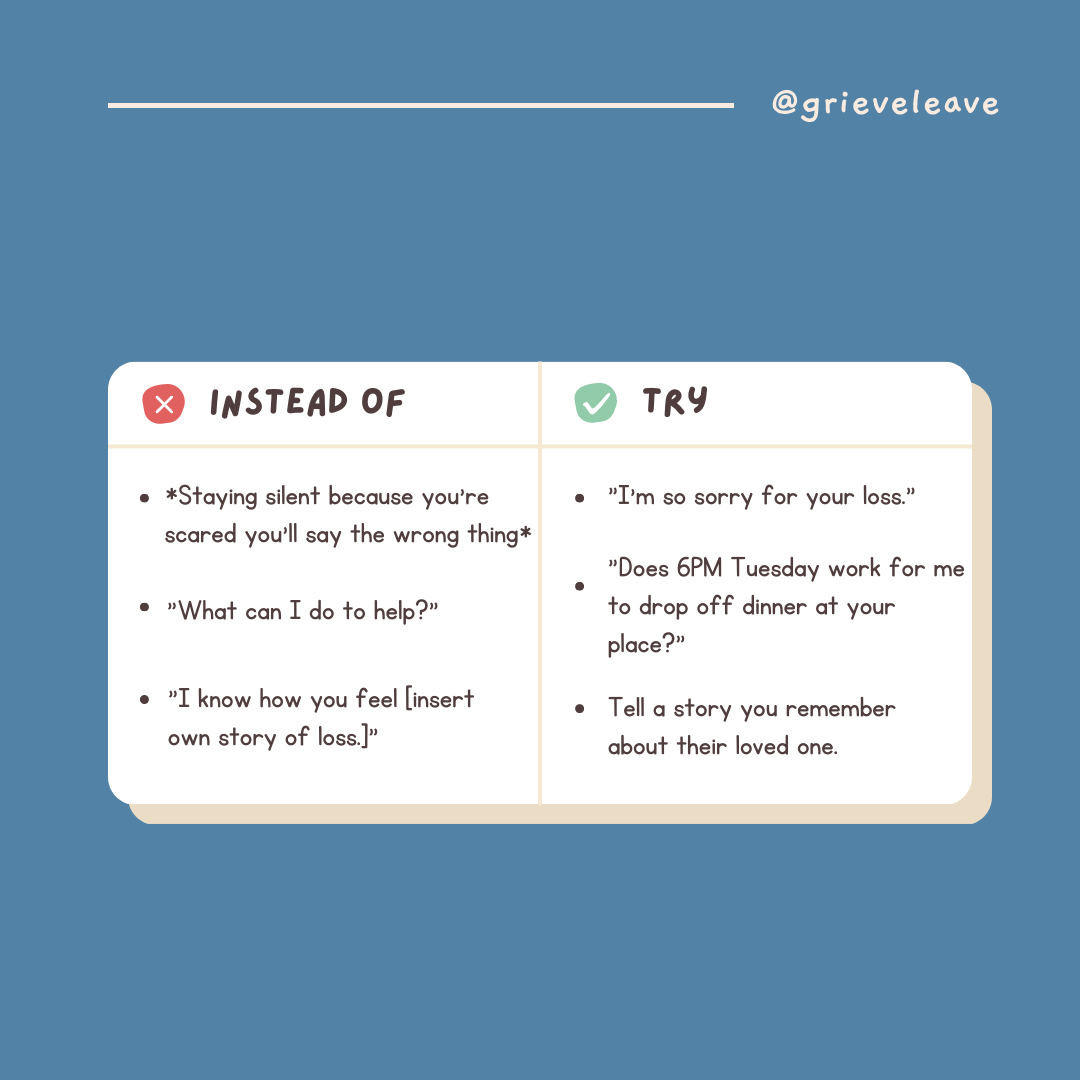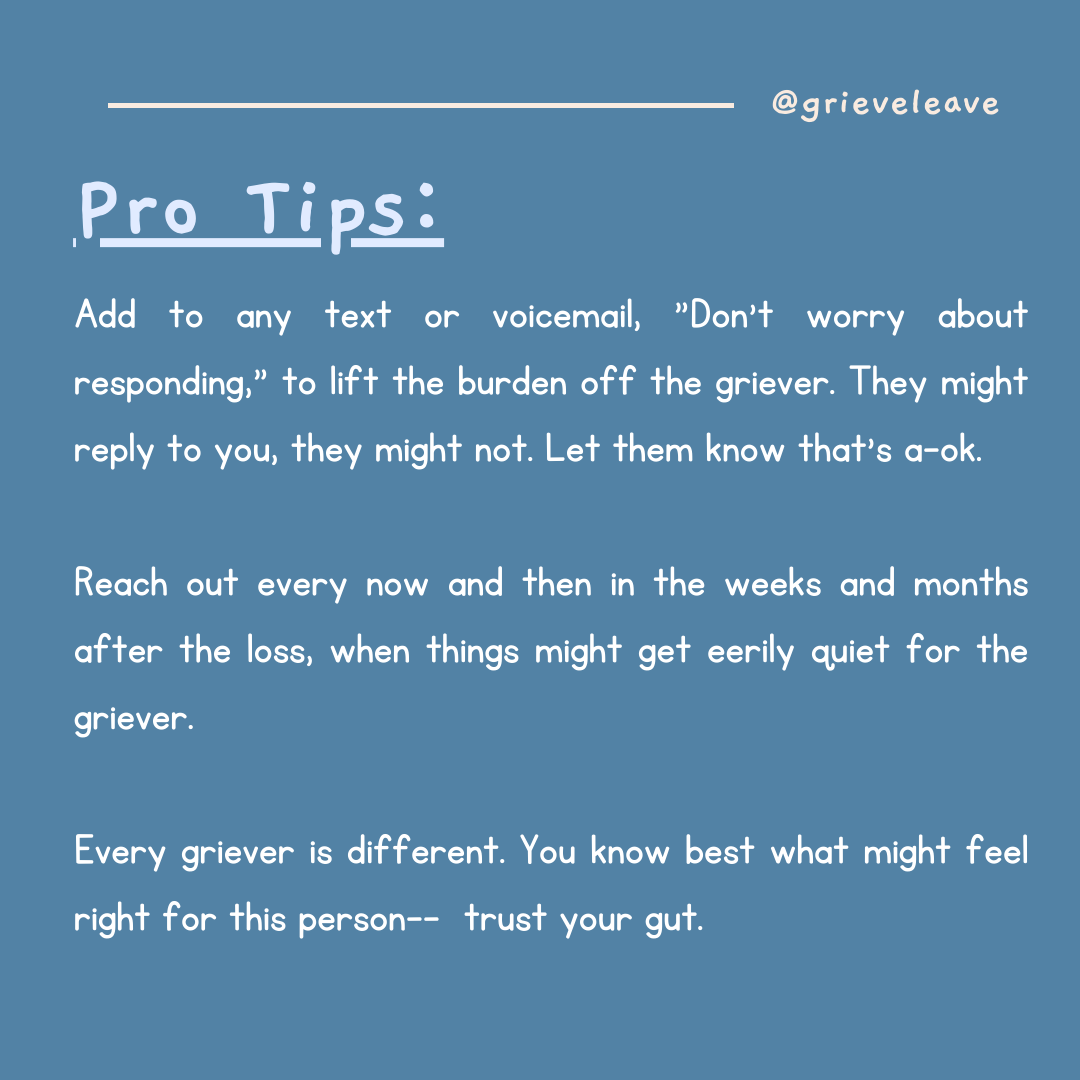What To Say To Someone Who's Grieving
Feb 19, 2023
Figuring out what to say to someone who is grieving can feel really overwhelming.
Every griever is different, so there are different ways to express your condolences that may fit your person best.
For folks who haven't experienced a significant loss (the death of a loved one, divorce, losing a job, a scary diagnosis, etc.), reaching out to someone who has can feel scary.
What if I say the wrong thing?
What if I offend them?
Do I know this person well enough to acknowledge something so…personal?
More than likely, though, hesitation to reach out/complete avoidance of contact has more to do with a discomfort at the idea of being vulnerable with your own emotions. Being vulnerable is HARD, we get it!
And then, even for folks who have themselves experienced a significant loss, reaching out to someone else might bring up emotions you're trying to keep tightly packaged up inside you…and you're scared to let them out. We get that too.
Whatever you may be feeling, we’re here to help! Experiencing a loss can feel isolating and lonely, so we always recommend trying to connect, whether it’s in-person, on a phone call, in a text, a card, or an email.

Things to say/do:
When in doubt, try: "I'm so sorry for your loss."
- It's short and sweet, authentic, and doesn't need a reply. A quick drive-by condolence.
- Variations include: "I'm so sorry to hear the news," "I'm so sorry about what happened," and "I'm just so sorry."
Offer a specific way to help and make a plan to do it: "Hey I'd love to bring you dinner one night this week. What's your address and when's the best time for me to stop by?"
- It takes the burden off the griever to ask for help, and it's hard for them to turn you down out of humility even though they really want to say yes when you go ahead and step right in with the game-plan.
- Variations include: Sending over a DoorDash/Grubhub/Uber Eats gift card without asking if they need it (trust me, they need it), "What's your favorite kind of pizza? Great, I'm bringing you some," or buying groceries for a week and delivering them to their door.
If a death: Tell a story you remember about their loved one.
- Learning a new story, or hearing an old one, can bring joy and help create space for the griever to share the stories and feelings they may be experiencing. Plus, it may make them feel like they’re a little less alone in remembering their loved one.
- Variations include: Sharing old photos of their loved one, asking around for other people to tell stories of the loved one and consolidating them into one email/letter/book.
Send flowers or a plant.
- This really works for any kind of significant loss. Couple with a card that says "I'm so sorry for your loss," or “We’re thinking of you,” and you've got yourself some A+ condolences, right there.
- You can also send flowers to the funeral home so that there are flowers actually at the burial, which is a very nice touch.
If a death: Make a donation in honor of their loved one.
- Sometimes obituaries will denote "In lieu of flowers, donations can be made to…xyz" – go for it, if that's the case, and don't send flowers.
- If their loved one died of a specific disease, you can donate to research centers to support finding a cure for that disease in the future. This is a thoughtful and meaningful way to show your care.
Add a parenthetical to any message you send or any voicemail you leave: "Don't worry about responding to this."
- THIS. This is a game charger. It lifts the burden off of the griever from feeling like the need to reply immediately.

Things to avoid saying/doing:
"Let me know if there is anything I can do to help!"
- There are infinite things grievers want and need but don’t know how to process or even start asking for help. They are already drained emotionally, so likely have no desire to make themselves more vulnerable by asking anyone for anything.
- Alternative: See above regarding making a specific offer to help. Or really pick anything else to say/do above.
"Look on the bright side…they're in a better place now…you'll be fine soon enough…you got this!!!!" [Insert any kind of toxic positivity].
- Just after the loss, you don't got this. And someone telling you that you do? It feels like you're worthless and not good enough. Let the griever feel however they need to feel in their darkest hour, without the reassurance of a “brighter side.”
- Alternative: Make a donation, because that's something positive you can do, yourself. Or say any of the phrases/do any of the actions in the previous section.
"I know how you feel" [Tell your own long story of a similar loss].
- This one requires a bit of nuance, because sometimes connecting with someone else who has experienced the same loss as you can be incredibly helpful as a griever. But you have to do it pretty carefully. What is challenging is when someone shares a long, detailed story of loss…basically what you're doing is putting more emotional burden on the griever, who is already strapped emotionally. In the immediate days after the loss, you feel like absolutely no one can ever understand the particular grief you're experiencing. So when someone says something like "I know how you feel," your gut instinct is to yell back at them, "No you effing don’t, lady!" Because your loss is still so raw and personal.
- Alternative: Pick any of the things in the previous section to say/do instead. OR, if you really do want to make a connection over grief, you could say something like, "If you ever want to talk in the future, I experienced a loss that I feel might be a similar experience. No pressure." Use your best judgment here.
Only reach out right after the loss.
- In the weeks and months after a loss, it can feel so eerily quiet…like everyone around you went back to normal, but you still have this gaping wound and no one cares anymore. Reach out to check-in and do any of the above suggestions a few weeks or months or even years after the loss.
Religious stuff.
- If you know the person and they are religious and you connect in that way (i.e. you go to church/religious services together), please ignore this one and you do you!
- But if you don't know the person well, receiving religious mementos or scripture can be very uncomfortable.
- Alternative: Pick something from the section above – like sending a plant!
Hopefully these are helpful and take some of the pressure off when you’re searching for the right thing to say. Remember– there is nothing that you can say that will “fix” anyone’s grief, so remove that burden and just say/do what feels right.
Grieve on!
Join the Grieve Leave movement
Share your info to join our Grieve Leave community. You don’t want to miss anything!


